-
 Bitcoin
Bitcoin $84,140.6204
-0.65% -
 Ethereum
Ethereum $1,571.7107
-1.08% -
 Tether USDt
Tether USDt $0.9999
-0.01% -
 XRP
XRP $2.0657
-1.57% -
 BNB
BNB $587.0749
0.63% -
 Solana
Solana $131.5042
2.64% -
 USDC
USDC $0.9999
0.00% -
 TRON
TRON $0.2477
-2.84% -
 Dogecoin
Dogecoin $0.1541
-0.47% -
 Cardano
Cardano $0.6147
0.44% -
 UNUS SED LEO
UNUS SED LEO $9.0845
-3.46% -
 Chainlink
Chainlink $12.3082
-0.44% -
 Avalanche
Avalanche $18.9724
-0.49% -
 Toncoin
Toncoin $2.9419
1.59% -
 Stellar
Stellar $0.2373
-0.06% -
 Shiba Inu
Shiba Inu $0.0...01167
-1.19% -
 Sui
Sui $2.0762
-1.59% -
 Hedera
Hedera $0.1594
0.08% -
 Bitcoin Cash
Bitcoin Cash $329.6626
2.63% -
 Polkadot
Polkadot $3.5903
0.80% -
 Litecoin
Litecoin $74.4026
-0.45% -
 Hyperliquid
Hyperliquid $16.1660
1.52% -
 Dai
Dai $1.0000
-0.01% -
 Bitget Token
Bitget Token $4.3245
-0.26% -
 Ethena USDe
Ethena USDe $0.9991
-0.01% -
 Pi
Pi $0.6112
-1.00% -
 Monero
Monero $215.3188
-1.23% -
 Uniswap
Uniswap $5.1249
-1.18% -
 OKB
OKB $50.3147
-2.91% -
 Pepe
Pepe $0.0...07131
-0.66%
What is the role of NFT in the gaming industry?
NFTs revolutionize gaming by giving players true ownership of in-game assets, enabling play-to-earn models, and fostering new, player-driven economies, though scalability, regulation, and environmental impact remain challenges.
Mar 02, 2025 at 04:19 am
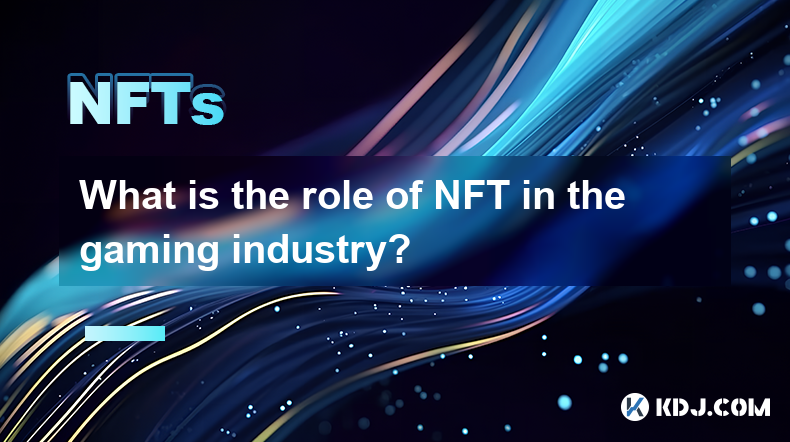
What is the Role of NFTs in the Gaming Industry?
Key Points:
- NFTs offer players true ownership of in-game assets, unlike traditional games where items are tied to a specific platform or account.
- NFTs facilitate the creation of play-to-earn (P2E) models, allowing players to generate income from their gameplay.
- NFTs enable the creation of new economic models within games, fostering player-driven marketplaces and economies.
- The interoperability of NFTs allows assets to be used across multiple games, increasing their value and utility.
- However, challenges remain regarding scalability, regulation, and the environmental impact of NFT minting.
- NFTs as Proof of Ownership: In traditional video games, in-game items are essentially rented. Players don't truly own their digital swords, skins, or virtual land; they only have the right to use them within the confines of that specific game, on that specific platform, under the terms and conditions set by the game developer. If the game shuts down, or the developer changes its terms of service, those items are lost. NFTs fundamentally change this dynamic. By leveraging blockchain technology, NFTs provide verifiable proof of ownership, ensuring players truly possess their in-game assets. This ownership is recorded on a public, immutable ledger, making it resistant to manipulation or deletion by the game developer. This means that players can theoretically take their assets with them if they decide to switch games or even sell them on a marketplace. This concept of verifiable ownership extends beyond simple cosmetic items. Imagine owning a piece of virtual land in a metaverse game, an NFT representing this land could be traded, rented, or even used as collateral for loans within the game's economy. The security and permanence offered by NFTs give players a sense of ownership never before experienced in the gaming world. The implications are far-reaching; players have a tangible stake in the game's success, fostering greater engagement and loyalty. This also opens up the potential for a secondary market where players can buy, sell, and trade their assets freely, creating a dynamic and vibrant in-game economy, completely independent of the game developers’ control. This freedom to own and trade assets is a key differentiator between NFT-based games and traditional games. This fosters a sense of community and ownership, creating a more robust and engaging gaming experience. However, the complexity of understanding and managing NFTs can be a barrier for entry for some players, and the volatile nature of the cryptocurrency market adds an element of risk.
- Play-to-Earn (P2E) Models: The integration of NFTs has revolutionized the gaming industry by enabling the emergence of play-to-earn (P2E) models. Unlike traditional games where players invest time and money without any financial return, P2E games allow players to earn cryptocurrency or other digital assets through gameplay. These assets, often represented as NFTs, can be traded or sold on marketplaces, generating real-world income. This innovative approach has attracted millions of players worldwide, transforming gaming from a purely recreational activity into a potential source of income. The P2E model relies heavily on the ownership and tradability of in-game assets facilitated by NFTs. Players can earn NFTs by completing quests, winning battles, or achieving specific milestones within the game. These NFTs can then be sold on dedicated marketplaces, allowing players to convert their in-game achievements into tangible value. The economic incentives built into P2E games often lead to increased player engagement and retention. However, concerns remain regarding the sustainability of P2E models, as the value of the in-game assets can fluctuate dramatically depending on market conditions. The potential for exploitation and the risk of creating unsustainable economic systems are also key considerations. Furthermore, the initial investment required to participate in some P2E games can be significant, potentially creating a barrier to entry for many players. The ethical implications of P2E and the potential for addiction and exploitation are topics that require careful consideration and regulation.
- New Economic Models: The introduction of NFTs has not only created new revenue streams for players but has also fundamentally reshaped the economic models within games. In traditional games, the developer controls the entire economy, dictating the value and availability of in-game items. With NFTs, players are empowered to participate directly in the game's economy. They can create, trade, and sell their own assets, fostering a more decentralized and player-driven marketplace. This creates a more dynamic and engaging environment where the game's economy is influenced by the actions and choices of its players. This shift towards decentralized economies can lead to greater community ownership and participation. Players have a vested interest in the success of the game's economy, as the value of their assets is directly tied to it. This can lead to increased engagement and a stronger sense of community among players. However, managing a complex, player-driven economy requires sophisticated mechanisms and careful oversight to prevent exploitation and maintain a fair and balanced environment. The potential for inflation, market manipulation, and other economic challenges needs to be carefully addressed. Furthermore, the lack of regulation in many NFT marketplaces can create risks for players. The development of robust and transparent systems for managing in-game economies is crucial for the long-term success of NFT-based games.
- Interoperability of NFTs: One of the most exciting potential benefits of NFTs in gaming is their interoperability. This means that NFTs can be used across multiple games and platforms, increasing their value and utility. Imagine an NFT representing a unique character that can be used in various games, each offering a different gameplay experience. This concept of interoperability opens up entirely new possibilities for game development and player interaction. It allows for the creation of interconnected game worlds and ecosystems, fostering greater creativity and innovation. This interoperability can also lead to the creation of new gaming experiences that transcend the boundaries of individual games. However, the technical challenges of achieving true interoperability are significant. Different game platforms and engines often use different standards and technologies, making it difficult to seamlessly integrate NFTs across various games. The development of universal standards and protocols is crucial for the realization of the full potential of NFT interoperability in gaming. Moreover, legal and regulatory hurdles may also pose challenges to the widespread adoption of interoperable NFTs. Addressing these challenges will be essential for unlocking the transformative potential of interoperable NFTs in the gaming industry. The development of open standards and collaborative efforts between game developers will be crucial for achieving this vision.
- Challenges and Concerns: Despite the potential benefits, several challenges and concerns surround the use of NFTs in gaming. Scalability remains a major hurdle, as blockchain networks can struggle to handle the high transaction volume associated with large-scale NFT games. Environmental concerns are also significant, as the energy consumption associated with minting NFTs can be substantial. Regulations surrounding NFTs and their use in games are still evolving, creating uncertainty for developers and players. Furthermore, the volatile nature of the cryptocurrency market introduces an element of risk for players who invest in in-game assets. Addressing these challenges requires a multifaceted approach, involving technological advancements, regulatory clarity, and a commitment to sustainable practices. The development of more energy-efficient blockchain technologies is crucial for mitigating environmental concerns. Clearer regulatory frameworks can provide greater certainty and protect players from exploitation. Finally, fostering greater education and awareness among players about the risks and benefits of NFTs is essential for promoting responsible adoption.
FAQs:
Q: What are the benefits of using NFTs in gaming?
A: NFTs offer players true ownership of in-game assets, enabling the creation of play-to-earn models, fostering new economic models within games, and allowing for the interoperability of assets across multiple games. This translates to increased player engagement, new revenue streams, and a more dynamic and player-driven gaming experience.
Q: What are the risks associated with NFTs in gaming?
A: Risks include the volatility of the cryptocurrency market, the environmental impact of NFT minting, scalability challenges of blockchain networks, and the potential for exploitation and market manipulation within in-game economies. Regulatory uncertainty also poses a challenge.
Q: How do NFTs differ from traditional in-game items?
A: Traditional in-game items are tied to specific platforms and are essentially rented, not owned. NFTs, on the other hand, provide verifiable proof of ownership recorded on a public, immutable ledger, allowing players to trade and sell their assets freely.
Q: Are all NFT games play-to-earn?
A: No, while many NFT games incorporate play-to-earn mechanics, not all do. Some games utilize NFTs solely for establishing verifiable ownership of in-game assets without a direct financial incentive.
Q: What is the future of NFTs in gaming?
A: The future of NFTs in gaming is uncertain but holds significant potential. Technological advancements, regulatory clarity, and the development of sustainable practices will play a crucial role in shaping the future of this evolving space. The potential for interoperability and the creation of truly player-driven economies are particularly exciting prospects.
Disclaimer:info@kdj.com
The information provided is not trading advice. kdj.com does not assume any responsibility for any investments made based on the information provided in this article. Cryptocurrencies are highly volatile and it is highly recommended that you invest with caution after thorough research!
If you believe that the content used on this website infringes your copyright, please contact us immediately (info@kdj.com) and we will delete it promptly.
- Former United States President Donald Trump is likely making a bold move into blockchain gaming
- 2025-04-17 23:15:12
- The TRUMP memecoin is set to unlock over $300 million worth of tokens this Saturday
- 2025-04-17 23:15:12
- Mantra Crypto (OM) Token Just Cratered, Shedding 80% of Its Value and Torching Billions in Market Cap
- 2025-04-17 23:10:12
- Chainlink (LINK) price has been under significant pressure recently, with a notable decline over the past three weeks.
- 2025-04-17 23:10:12
- Pi Network Price Prediction: Will the Pi Token Reach $30 If Banks Adopt It?
- 2025-04-17 23:05:12
- Ultra-rare coins with royal connection could be worth small fortune
- 2025-04-17 23:05:12
Related knowledge
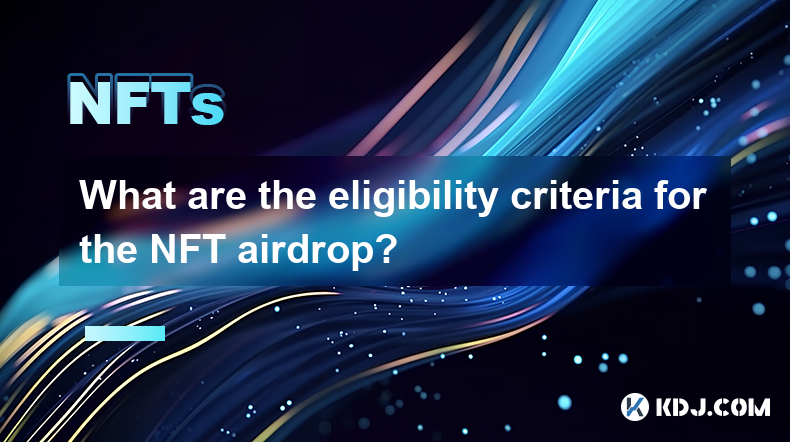
What are the eligibility criteria for the NFT airdrop?
Apr 17,2025 at 04:56pm
Understanding NFT AirdropsNFT airdrops are a popular method used by blockchain projects to distribute non-fungible tokens (NFTs) to their community members. These airdrops can serve various purposes, such as rewarding loyal users, promoting new projects, or increasing the visibility of existing ones. To participate in an NFT airdrop, individuals must me...

How to combine traditional artworks with NFTs?
Apr 17,2025 at 12:35am
The integration of traditional artworks with Non-Fungible Tokens (NFTs) represents a fascinating intersection of art and technology, offering artists and collectors new ways to engage with and monetize art. This article will explore how traditional artworks can be combined with NFTs, providing a detailed guide on the process, benefits, and consideration...
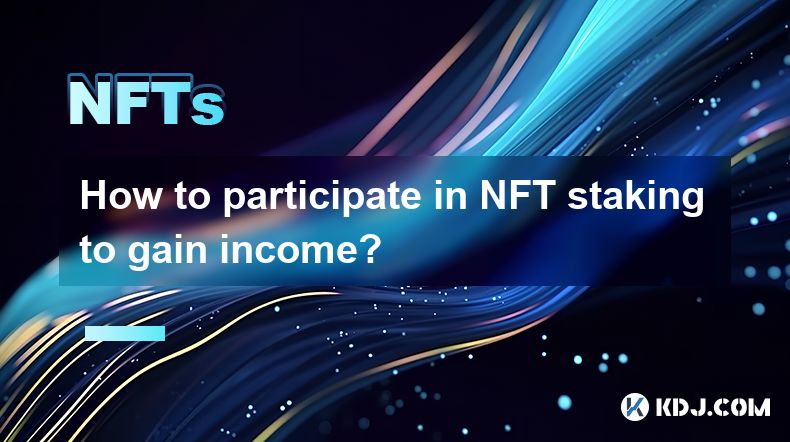
How to participate in NFT staking to gain income?
Apr 17,2025 at 06:14pm
Participating in NFT staking to generate income has become an increasingly popular method within the cryptocurrency community. NFT staking involves locking up your Non-Fungible Tokens in a smart contract to earn rewards, typically in the form of additional tokens or other benefits. This guide will walk you through the process of participating in NFT sta...
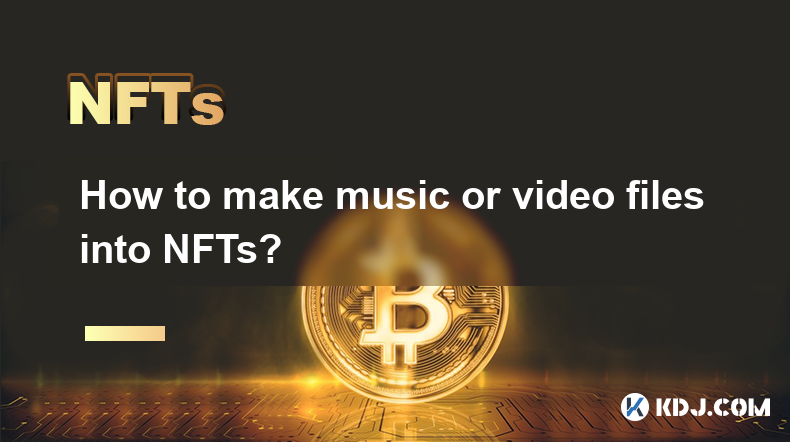
How to make music or video files into NFTs?
Apr 16,2025 at 10:29pm
Creating music or video files into Non-Fungible Tokens (NFTs) has become an increasingly popular way for artists and creators to monetize their work directly. This process involves converting your digital content into a unique token on a blockchain, which can then be bought, sold, or traded. Here’s a detailed guide on how to transform your music or vide...
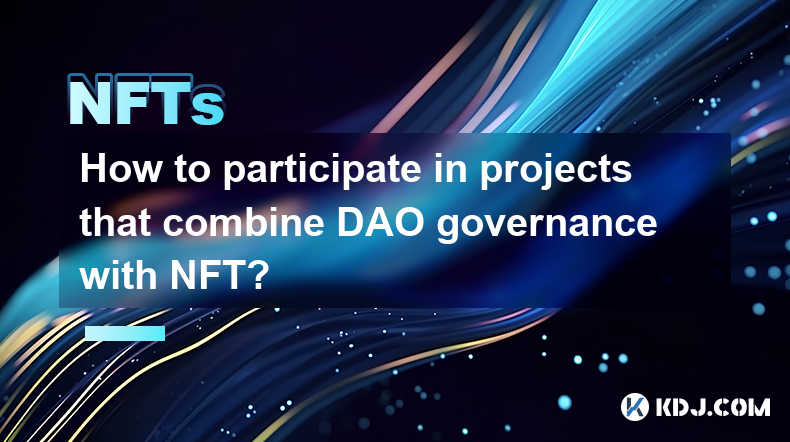
How to participate in projects that combine DAO governance with NFT?
Apr 17,2025 at 10:14am
Participating in projects that combine DAO governance with NFTs offers a unique opportunity to engage with decentralized communities and digital assets. These projects often involve voting on project decisions and owning unique digital tokens that can represent membership, access, or other benefits. Here's a detailed guide on how to participate in such ...
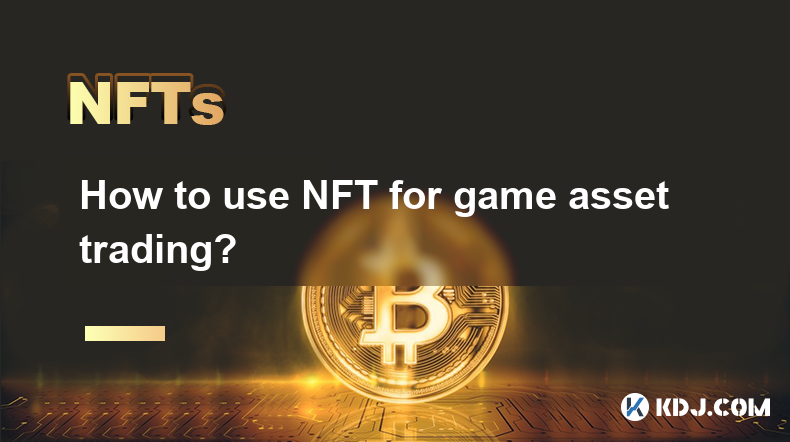
How to use NFT for game asset trading?
Apr 17,2025 at 12:21pm
Using Non-Fungible Tokens (NFTs) for game asset trading has become an increasingly popular method for gamers and developers alike to buy, sell, and trade unique in-game items. NFTs provide a way to prove ownership and authenticity of digital assets, making them perfect for trading game items that have unique characteristics and value. In this article, w...

What are the eligibility criteria for the NFT airdrop?
Apr 17,2025 at 04:56pm
Understanding NFT AirdropsNFT airdrops are a popular method used by blockchain projects to distribute non-fungible tokens (NFTs) to their community members. These airdrops can serve various purposes, such as rewarding loyal users, promoting new projects, or increasing the visibility of existing ones. To participate in an NFT airdrop, individuals must me...

How to combine traditional artworks with NFTs?
Apr 17,2025 at 12:35am
The integration of traditional artworks with Non-Fungible Tokens (NFTs) represents a fascinating intersection of art and technology, offering artists and collectors new ways to engage with and monetize art. This article will explore how traditional artworks can be combined with NFTs, providing a detailed guide on the process, benefits, and consideration...

How to participate in NFT staking to gain income?
Apr 17,2025 at 06:14pm
Participating in NFT staking to generate income has become an increasingly popular method within the cryptocurrency community. NFT staking involves locking up your Non-Fungible Tokens in a smart contract to earn rewards, typically in the form of additional tokens or other benefits. This guide will walk you through the process of participating in NFT sta...

How to make music or video files into NFTs?
Apr 16,2025 at 10:29pm
Creating music or video files into Non-Fungible Tokens (NFTs) has become an increasingly popular way for artists and creators to monetize their work directly. This process involves converting your digital content into a unique token on a blockchain, which can then be bought, sold, or traded. Here’s a detailed guide on how to transform your music or vide...

How to participate in projects that combine DAO governance with NFT?
Apr 17,2025 at 10:14am
Participating in projects that combine DAO governance with NFTs offers a unique opportunity to engage with decentralized communities and digital assets. These projects often involve voting on project decisions and owning unique digital tokens that can represent membership, access, or other benefits. Here's a detailed guide on how to participate in such ...

How to use NFT for game asset trading?
Apr 17,2025 at 12:21pm
Using Non-Fungible Tokens (NFTs) for game asset trading has become an increasingly popular method for gamers and developers alike to buy, sell, and trade unique in-game items. NFTs provide a way to prove ownership and authenticity of digital assets, making them perfect for trading game items that have unique characteristics and value. In this article, w...
See all articles























































































